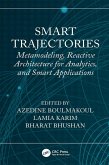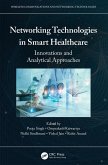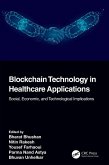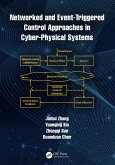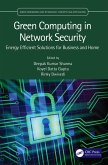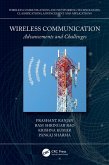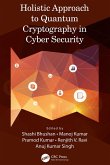Smart Trajectories (eBook, ePUB)
Metamodeling, Reactive Architecture for Analytics, and Smart Applications
Redaktion: Boulmakoul, Azedine; Bhushan, Bharat; Karim, Lamia
48,95 €
48,95 €
inkl. MwSt.
Sofort per Download lieferbar

24 °P sammeln
48,95 €
Als Download kaufen

48,95 €
inkl. MwSt.
Sofort per Download lieferbar

24 °P sammeln
Jetzt verschenken
Alle Infos zum eBook verschenken
48,95 €
inkl. MwSt.
Sofort per Download lieferbar
Alle Infos zum eBook verschenken

24 °P sammeln
Smart Trajectories (eBook, ePUB)
Metamodeling, Reactive Architecture for Analytics, and Smart Applications
Redaktion: Boulmakoul, Azedine; Bhushan, Bharat; Karim, Lamia
- Format: ePub
- Merkliste
- Auf die Merkliste
- Bewerten Bewerten
- Teilen
- Produkt teilen
- Produkterinnerung
- Produkterinnerung

Bitte loggen Sie sich zunächst in Ihr Kundenkonto ein oder registrieren Sie sich bei
bücher.de, um das eBook-Abo tolino select nutzen zu können.
Hier können Sie sich einloggen
Hier können Sie sich einloggen
Sie sind bereits eingeloggt. Klicken Sie auf 2. tolino select Abo, um fortzufahren.

Bitte loggen Sie sich zunächst in Ihr Kundenkonto ein oder registrieren Sie sich bei bücher.de, um das eBook-Abo tolino select nutzen zu können.
This book highlights the developments, discoveries, and practical and advanced experiences related to responsive distributed computing and how it can support the deployment of trajectory-based applications in smart systems.
- Geräte: eReader
- ohne Kopierschutz
- eBook Hilfe
- Größe: 8.68MB
Andere Kunden interessierten sich auch für
![Smart Trajectories (eBook, PDF) Smart Trajectories (eBook, PDF)]() Smart Trajectories (eBook, PDF)48,95 €
Smart Trajectories (eBook, PDF)48,95 €![Networking Technologies in Smart Healthcare (eBook, ePUB) Networking Technologies in Smart Healthcare (eBook, ePUB)]() Networking Technologies in Smart Healthcare (eBook, ePUB)59,95 €
Networking Technologies in Smart Healthcare (eBook, ePUB)59,95 €![Blockchain Technology in Healthcare Applications (eBook, ePUB) Blockchain Technology in Healthcare Applications (eBook, ePUB)]() Blockchain Technology in Healthcare Applications (eBook, ePUB)48,95 €
Blockchain Technology in Healthcare Applications (eBook, ePUB)48,95 €![Networked and Event-Triggered Control Approaches in Cyber-Physical Systems (eBook, ePUB) Networked and Event-Triggered Control Approaches in Cyber-Physical Systems (eBook, ePUB)]() Jinhui ZhangNetworked and Event-Triggered Control Approaches in Cyber-Physical Systems (eBook, ePUB)49,95 €
Jinhui ZhangNetworked and Event-Triggered Control Approaches in Cyber-Physical Systems (eBook, ePUB)49,95 €![Green Computing in Network Security (eBook, ePUB) Green Computing in Network Security (eBook, ePUB)]() Green Computing in Network Security (eBook, ePUB)48,95 €
Green Computing in Network Security (eBook, ePUB)48,95 €![Wireless Communication (eBook, ePUB) Wireless Communication (eBook, ePUB)]() Prashant RanjanWireless Communication (eBook, ePUB)48,95 €
Prashant RanjanWireless Communication (eBook, ePUB)48,95 €![Holistic Approach to Quantum Cryptography in Cyber Security (eBook, ePUB) Holistic Approach to Quantum Cryptography in Cyber Security (eBook, ePUB)]() Holistic Approach to Quantum Cryptography in Cyber Security (eBook, ePUB)49,95 €
Holistic Approach to Quantum Cryptography in Cyber Security (eBook, ePUB)49,95 €-
-
-
This book highlights the developments, discoveries, and practical and advanced experiences related to responsive distributed computing and how it can support the deployment of trajectory-based applications in smart systems.
Dieser Download kann aus rechtlichen Gründen nur mit Rechnungsadresse in A, B, BG, CY, CZ, D, DK, EW, E, FIN, F, GR, HR, H, IRL, I, LT, L, LR, M, NL, PL, P, R, S, SLO, SK ausgeliefert werden.
Produktdetails
- Produktdetails
- Verlag: Taylor & Francis eBooks
- Seitenzahl: 352
- Erscheinungstermin: 30. Dezember 2022
- Englisch
- ISBN-13: 9781000817461
- Artikelnr.: 66442629
- Verlag: Taylor & Francis eBooks
- Seitenzahl: 352
- Erscheinungstermin: 30. Dezember 2022
- Englisch
- ISBN-13: 9781000817461
- Artikelnr.: 66442629
- Herstellerkennzeichnung Die Herstellerinformationen sind derzeit nicht verfügbar.
Azedine Boulmakoul, Lamia Karim, Bharat Bhushan
1. Intelligent Distributed Computing Paradigm. 2. Multi Micro-Agent System
Middleware Model based on Event Sourcing and CQRS Patterns. 3. Intelligent
Distributed Computing Paradigm: Emergence, Challenges and Future Research
Directions. 4. Emerging Paradigm of Urban Computing: Challenges,
Applications, and Future Research Directions. 5. Complex Event Processing
Architectures for Smart City Applications. 6. Portunus: Enhancing smart
city application connectivity with complex space-time events distributed
system. 7. Smart Trajectories Metamodeling. 8. A Type Level Trajectory
Framework. 9. A Distributed Reactive Trajectory Framework for Nearby Events
Discovery. 10. A Multidimensional Trajectory Model in the Context of Mobile
Crowd Sensing. 11. Trajectory mining based on Process mining in RORO
terminals: Performance-Driven Analysis to support trajectories redesign.
12. Aspects from mobility data in fog/cloud era: Directions from a pilot
case study of Hazmat transportation telemonitoring in urban area. 13.
Utility assessment of line-of-sight traffic jam and queue detection in
urban environments for intelligent road vehicles. 14. Risky Trajectory
Prediction for Safe Walkability under Intuitionistic Fuzzy Environment. 15.
A real-time reactive Service Oriented Architecture for safe urban
walkability. 16. Safest Trajectories for Pedestrian using Distributed
Architecture based on Spatial Risk Analysis and Voronoï Spatial
Accessibility. 17. Towards a predictive simulation framework of accidents
risks for pedestrians based on distributed artificial intelligence and
intuitionist fuzzy modeling. 18. Trajectory to a new shape of
organizational structure, Enterprise Architect and Organizational Audit for
Governance of Information Systems Processes. 19. Dynamic detection of fuzzy
sub-congested urban traffic networks. 20. Multi-Agent Modeling for
Pedestrian Risk Assessment.
Middleware Model based on Event Sourcing and CQRS Patterns. 3. Intelligent
Distributed Computing Paradigm: Emergence, Challenges and Future Research
Directions. 4. Emerging Paradigm of Urban Computing: Challenges,
Applications, and Future Research Directions. 5. Complex Event Processing
Architectures for Smart City Applications. 6. Portunus: Enhancing smart
city application connectivity with complex space-time events distributed
system. 7. Smart Trajectories Metamodeling. 8. A Type Level Trajectory
Framework. 9. A Distributed Reactive Trajectory Framework for Nearby Events
Discovery. 10. A Multidimensional Trajectory Model in the Context of Mobile
Crowd Sensing. 11. Trajectory mining based on Process mining in RORO
terminals: Performance-Driven Analysis to support trajectories redesign.
12. Aspects from mobility data in fog/cloud era: Directions from a pilot
case study of Hazmat transportation telemonitoring in urban area. 13.
Utility assessment of line-of-sight traffic jam and queue detection in
urban environments for intelligent road vehicles. 14. Risky Trajectory
Prediction for Safe Walkability under Intuitionistic Fuzzy Environment. 15.
A real-time reactive Service Oriented Architecture for safe urban
walkability. 16. Safest Trajectories for Pedestrian using Distributed
Architecture based on Spatial Risk Analysis and Voronoï Spatial
Accessibility. 17. Towards a predictive simulation framework of accidents
risks for pedestrians based on distributed artificial intelligence and
intuitionist fuzzy modeling. 18. Trajectory to a new shape of
organizational structure, Enterprise Architect and Organizational Audit for
Governance of Information Systems Processes. 19. Dynamic detection of fuzzy
sub-congested urban traffic networks. 20. Multi-Agent Modeling for
Pedestrian Risk Assessment.
1. Intelligent Distributed Computing Paradigm. 2. Multi Micro-Agent System
Middleware Model based on Event Sourcing and CQRS Patterns. 3. Intelligent
Distributed Computing Paradigm: Emergence, Challenges and Future Research
Directions. 4. Emerging Paradigm of Urban Computing: Challenges,
Applications, and Future Research Directions. 5. Complex Event Processing
Architectures for Smart City Applications. 6. Portunus: Enhancing smart
city application connectivity with complex space-time events distributed
system. 7. Smart Trajectories Metamodeling. 8. A Type Level Trajectory
Framework. 9. A Distributed Reactive Trajectory Framework for Nearby Events
Discovery. 10. A Multidimensional Trajectory Model in the Context of Mobile
Crowd Sensing. 11. Trajectory mining based on Process mining in RORO
terminals: Performance-Driven Analysis to support trajectories redesign.
12. Aspects from mobility data in fog/cloud era: Directions from a pilot
case study of Hazmat transportation telemonitoring in urban area. 13.
Utility assessment of line-of-sight traffic jam and queue detection in
urban environments for intelligent road vehicles. 14. Risky Trajectory
Prediction for Safe Walkability under Intuitionistic Fuzzy Environment. 15.
A real-time reactive Service Oriented Architecture for safe urban
walkability. 16. Safest Trajectories for Pedestrian using Distributed
Architecture based on Spatial Risk Analysis and Voronoï Spatial
Accessibility. 17. Towards a predictive simulation framework of accidents
risks for pedestrians based on distributed artificial intelligence and
intuitionist fuzzy modeling. 18. Trajectory to a new shape of
organizational structure, Enterprise Architect and Organizational Audit for
Governance of Information Systems Processes. 19. Dynamic detection of fuzzy
sub-congested urban traffic networks. 20. Multi-Agent Modeling for
Pedestrian Risk Assessment.
Middleware Model based on Event Sourcing and CQRS Patterns. 3. Intelligent
Distributed Computing Paradigm: Emergence, Challenges and Future Research
Directions. 4. Emerging Paradigm of Urban Computing: Challenges,
Applications, and Future Research Directions. 5. Complex Event Processing
Architectures for Smart City Applications. 6. Portunus: Enhancing smart
city application connectivity with complex space-time events distributed
system. 7. Smart Trajectories Metamodeling. 8. A Type Level Trajectory
Framework. 9. A Distributed Reactive Trajectory Framework for Nearby Events
Discovery. 10. A Multidimensional Trajectory Model in the Context of Mobile
Crowd Sensing. 11. Trajectory mining based on Process mining in RORO
terminals: Performance-Driven Analysis to support trajectories redesign.
12. Aspects from mobility data in fog/cloud era: Directions from a pilot
case study of Hazmat transportation telemonitoring in urban area. 13.
Utility assessment of line-of-sight traffic jam and queue detection in
urban environments for intelligent road vehicles. 14. Risky Trajectory
Prediction for Safe Walkability under Intuitionistic Fuzzy Environment. 15.
A real-time reactive Service Oriented Architecture for safe urban
walkability. 16. Safest Trajectories for Pedestrian using Distributed
Architecture based on Spatial Risk Analysis and Voronoï Spatial
Accessibility. 17. Towards a predictive simulation framework of accidents
risks for pedestrians based on distributed artificial intelligence and
intuitionist fuzzy modeling. 18. Trajectory to a new shape of
organizational structure, Enterprise Architect and Organizational Audit for
Governance of Information Systems Processes. 19. Dynamic detection of fuzzy
sub-congested urban traffic networks. 20. Multi-Agent Modeling for
Pedestrian Risk Assessment.

